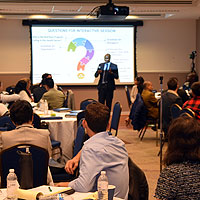Health Systems Flagship Core Course
The Core course recommends a systems-based approach to identify the necessary policy levers for achieving desired health system objectives. It is usually a 1-2 week long course that presents an overview of options to policy makers, enables them to consider the strengths and weaknesses of various approaches, helps them define their challenges, and provides them with information that enables them to come to their own decisions. Core Course
Testimonials
“Getting to learn from the various Bank facilitators with different backgrounds, deep knowledge and practical experience, they were able to illustrate their instructive materials with real life examples which made concepts easy to understand and relate.”
“I had the opportunity of learning different and new concepts all together. The whole experience was eye opening for me. I learnt that the data we collect daily should inform programming for the next programs and projects.”
“It was most valuable to learn problem diagnosis: getting to the root cause, establishing winning strategies and finding an effective solution”
“Sharing of country experiences re-enforced learning and allowed for the application of theories and concepts to country-specific situations”
“This is one of the advance learning platforms I have been enrolled in. The facilitators pinpoint the solutions we can use in addressing health issues and they seek for our opinion through the pooling”
------------------------------------------------------------------------------------------------------------------
2024
May 13-24, Global Course (Virtual)
~401 participants from 47 countries
By invitation only
2023
December 3-7, Cairo, Egypt
88 participants in-person
Course Materials and resources
August 15-18, Prizren, Kosovo
30 participants in-person
Course Materials and resources
May 15-17, Nagasaki, Japan
65 participants in-person
January 25 - 27, Quito, Ecuador (Hybrid: Virtual and In-person)
Over 70 Participants registered – Course offered in Spanish and English
Course Materials and resources
Pre-reads | Recommended Reading/Bibliography
---------------------------------------------------------------------------------------
2022
October 17–28 (Virtual)
Over 600 Participants Registered – Course offered in English, French, Portuguese, Russian, and Spanish
Course materials and resources
Pre-reads | Recommended Reading/Bibliography
June 7-18 (Virtual)
480 Participants Registered - Course conducted in English, French and Russian
Course materials and resources
May 22 & June 3 (Virtual)
Country flagship core course (Argentina)
130 Participants Registered - Course conducted in Spanish
Course materials and resources
---------------------------------------------------------------------------------------------------------------------------------------------
2021
June 7-18 (Virtual)
Over 300 Participants registered for the course and over 240 completed 16 Sessions/Training Modules over 7 non-concurrent days of interactive webinars, pre-readings, eLearning courses, and Group Work leading to Country Presentations on the final day.
Course materials and resources
---------------------------------------------------------------------------------------------------------------------------------------------
2019
October 28 - November 5 (In-person, Washington DC)
In-person 1 week intensive course intended for teams of senior-level and mid-level policy makers working in Health, Health Insurance, or Finance, and their development partners. The course was focused on the challenge of human capital and Universal Health Coverage.
---------------------------------------------------------------------------------------------------------------------------------------------
Disclaimer: The Flagship course materials are a product of the staff of the IBRD/the World Bank and external participants to the event. The findings, interpretations, and conclusions expressed in this event do not necessarily reflect the views of the World Bank, the Executive Directors of the World Bank or the governments they represent. The World Bank does not guarantee the accuracy of the data included in this work. The materials should not be reproduced or distributed without the World Bank's prior consent.


